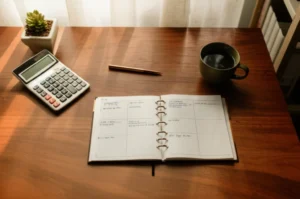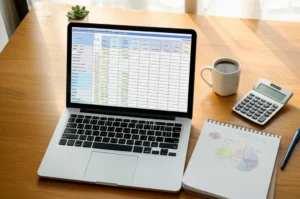Let me ask you something… have you ever glanced at your bank statement and thought, “Wait, where did all my money go?” Yeah, me too. It’s wild how those small, everyday expenses sneak up on us, right? But here’s the good news: there’s a surprisingly simple tool that can save you from that “Where did it all go?” panic—it’s called budgeting. And guess what? mastering the 10 importance of budget isn’t just about math or cutting fun stuff out; it’s about giving your money a purpose. So, sit tight—and I promise this won’t be the “boring budgeting” lecture you were dreading.
Why Budget?
The Sneaky Spending Clues
Ever thought about why, despite earning okay money, you feel like you never quite have enough? Spoiler: it often isn’t about making more, but knowing where your money’s slipping away. Budgeting is like shining a flashlight into those dim corners of your spending. You start seeing patterns—coffee runs here, subscriptions you forgot about there. And once you spot them? Boom. You can actually decide whether those expenses deserve a spot in your budget.
Example Breakdown
| Category | Without Budget | With Budget |
|---|---|---|
| Eating Out | $200/month | $100/month (set limit) |
| Subscriptions | $50/month (includes forgotten apps) | $30/month (cancelled unused ones) |
| Emergency Savings | $0 | $50/month (auto-deposit) |
By the way, if you’re managing money for a family, you might want to check out the 5 importance of family budget—it breaks down how keeping everyone in the loop makes saving easier and less stressful. Trust me, it helps when everyone’s rowing the same boat.
Less Stress, More Control
Money stress… it’s a real thing. And let’s face it, worrying about bills or unexpected expenses is exhausting. That’s where budgeting becomes your stress-buster. Imagine knowing exactly how much you’ve got, what’s going out, and what’s safely tucked away. It’s like having a financial map for your life, so when surprises happen (and they will), you’re ready—not panicked.
Why Stress Less?
- You’re less likely to miss payments.
- You build an emergency fund—because life throws curveballs.
- You get to say “yes” to things you really care about.
Sounds dreamy, right? And there’s more. Beyond just peace of mind, budgeting helps you make smarter money calls. Think of it like having a financial GPS rather than wandering lost in “spending nowhere land.”
Save Smarter
Habit Hacking with Budgeting
Okay, here’s a personal confession: I used to think I didn’t spend much on coffee out and quick dinners. Until I tracked it—and saw that those little “treats” were eating up a good chunk of my cash. Tracking your spending is the heart of budgeting. It reveals your habits. And with that info, you can tweak what needs tweaking.
For example, switching to brewing your own coffee saves money without killing your morning vibe. Or meal prepping once or twice a week can seriously trim food costs and stress. What’s cool is that small changes add up—like little snowballs rolling down a hill, gathering tons of savings energy.
If you’re curious how families do this juggling act, the 10 components of family budget is a neat guide to help you align spending with your household’s priorities. You might just find some inspiration there on managing your own frugal life.
Goals Made Doable
Dreams can feel overwhelming—saving for a house, paying off debt, or building that emergency fund. But here’s the trick: budget breaks your big goals into bite-sized steps. Instead of thinking, “I have to save $20,000,” you budget a small amount each month. That slow, steady approach? It works like magic.
Plus, budgeting nudges you to keep those goals front and center. It’s your monthly reminder that puts your money toward what you really want, not just what’s easy or impulsive.
If you want more ideas on how budgeting helps with setting and reaching goals, the 5 importance of budgeting breaks this down in an easy-to-digest way.
Family Finances
Teamwork Makes the Dream Work
Ever tried budgeting alone? It’s a struggle. Now, add a spouse, kids, or roommates into the mix? It can feel like herding cats. But involving the whole family makes money stuff… less lonely and more manageable. When everyone gets what’s going on—expenses, savings, and goals—it’s easier to stick to the plan.
Top 10 Family Budget Parts
Here’s a quick look at the 10 components of family budget that make it all flow smoother:
| Component | Why It Matters |
|---|---|
| Housing | Biggest single expense—needs careful tracking |
| Utilities | Essential but often underestimated |
| Food | Feeding everyone without blowing the budget |
| Transportation | Includes gas, public transit, car payment |
| Healthcare | Unexpected but unavoidable costs |
| Savings/Emergency | Your safety net |
| Debt repayment | Freeing up future cash flow |
| Entertainment | Balance fun with frugality |
| Education | Investing in the future |
| Miscellaneous | Random expenses that pop up |
It sounds like a lot, but breaking your budget into these chunks makes it feel… doable. And it’s that kind of organization that helps keep everyone calm—and on the same page. For a deeper dive, the 5 importance of family budget essay is a good read for how these parts come together in the bigger picture.
Future-Proofing with a Budget
Life throws curveballs. Job losses, medical bills, car repairs—you know the drill. Without a plan, these hit hard and fast. But here’s the thing: a well-structured budget helps you prepare for the unexpected. That emergency fund? It’s your life jacket. Knowing you have it means panic doesn’t take over when things go sideways.
Plus, budgeting helps you spot risks early. Maybe your income dips, or a big expense is looming. Budgeting gives you a heads up so you can adjust—not just blindly hope for the best.
Keep It Real
Budgeting Isn’t Perfect, And That’s Okay
Look, budgets aren’t meant to be rigid or boring (please, no!). They’re tools to help you, not chains to bind you. Sometimes, you’ll overspend, or you’ll need to shuffle funds around. That’s totally normal.
The key is flexibility and honesty. Your budget is a living thing, meant to change with your needs and life stages. And yes, that means allowing space for a treat now and then—because life without joy isn’t worth it.
Start Small, Build Big
If all this sounds overwhelming, start with one simple step: write down your income and biggest expenses for one month. No need to track every coffee or impulse buy—yet. Just get a snapshot.
Next, choose one goal. Maybe it’s saving $20 a week or cutting down on takeout to twice a week. Small wins build momentum, promise. And sticking with it? That’s where real magic happens.
Your Budget, Your Story
So, what do you say? Ready to turn those mysterious money leaks into a plan that works for you? A budget isn’t about restriction; it’s about freedom. Freedom to know where your money’s going and to make it work toward what truly matters.
Remember, the 5 importance of family budget and 5 importance of budgeting highlight how budgeting brings clarity and peace—no matter your income or family size. It’s not just numbers; it’s a tool for hope and progress.
How about this: today, grab a notebook or your phone, take 10 minutes, and jot down your monthly income and major expenses. Just that—no pressure. Then think about one small change you could try this week to save more or spend smarter. It might feel tiny now, but trust me, that’s how big financial wins get started.
What’s your first move going to be? I’d love to hear about it—drop a note in the comments or share with someone who needs to hear this. After all, we’re all in this money maze together.













